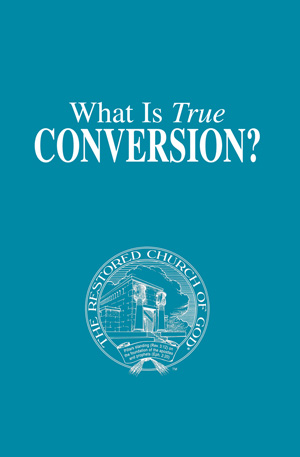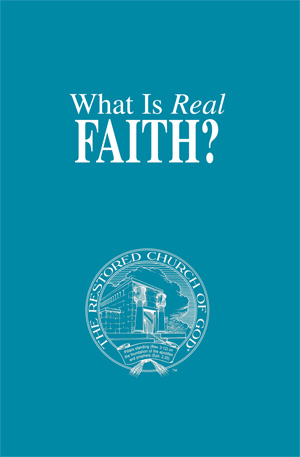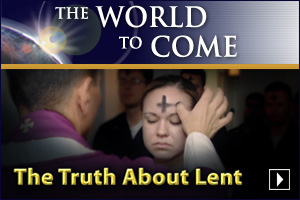When is a person converted? I have known many who doubted their conversion because they had never been taught the meaning of true conversion. When under fire—under pressure—they lacked the confidence to know they could effectively address their problems. They were not sure that they even had the power to overcome them.
Since the devil—the author of confusion (I Cor. 14:33)—deceives the whole world (Rev. 12:9), he also seeks to confuse professing Christians about this most important subject.
Just what is a real Christian? Is he one who “attends church”—“professes Jesus”—“knows Christ”—has been “baptized”? Is there a single verse to which we can turn that gives the Bible definition of a real Christian—that eliminates all confusion?
The apostle Paul wrote, “For as many as are led by the Spirit of God, they are the sons of God” (Rom. 8:14). A Christian, then, is one who has the Holy Spirit leading him. But is having God’s Spirit absolutely essential to being a Christian? By this point in the context, Paul had already said, “But you are not in the flesh, but in the Spirit, if so be that the Spirit of God dwell in you. Now if any man have not the Spirit of Christ, he is none of His” (vs. 9)!
It is that simple! One either has the Spirit of God, and is a Christian, or one does not have it and is not a Christian—is “none of His.” All those who are truly converted have the Holy Spirit in them.
But what does this mean? Is receiving God’s Spirit all there is to Christianity and conversion—or is there more?
Receiving Power
Christ taught the apostles for forty days after His Resurrection (Acts 1:3). He instructed them to wait in Jerusalem until they would receive the Holy Spirit ten days later, on the Feast of Pentecost. The disciples asked Him if He was about to establish His Kingdom on Earth. Just before ascending to heaven, He said, “It is not for you to know the times or the seasons…but you shall receive power, after that the Holy Spirit is come upon you” (vs. 7-8). He then disappeared into a cloud.
Like the apostles waiting for power through the Holy Spirit, most people today wait for some kind of additional strength upon conversion. Tell a teenager that he will be given the keys to the family car and he will have no difficulty understanding he is about to receive real power. The first time I was handed the keys to my father’s car, I understood exactly what it meant. It is no different with a potential Christian waiting to receive God’s Spirit at repentance and baptism.
Paul wrote Timothy, “For God has not given us the spirit of fear; but of power, and of love, and of a sound mind” (II Tim. 1:7). Since Christians have the Spirit of God, very real power has come into their lives. Of course, the verse also says that a Christian demonstrates love—or the give way of life—and that his conduct reflects a sound mind.
The fact that God’s Spirit imparts sound-mindedness is evidence that God wants Christians to understand their calling—their conversion—God’s purpose for them. God wants people to be sound in His way. Of course, this must include understanding all the basic aspects of true conversion.
When Is the Holy Spirit Given?
How does one actually receive God’s Spirit? And how can he know for certain that it has been given? Since this moment constitutes conversion, at what point can the would-be Christian be assured that God has given His Spirit? Since not having God’s Spirit precludes one from being a true Christian, surely God would not leave His servants in doubt as to whether they have it—exactly when they receive it!
The book of Acts states, “Then Peter said unto them, Repent, and be baptized every one of you in the name of Jesus Christ for the remission of sins, and you shall receive the gift of the Holy Spirit” (2:38).
Receiving God’s Spirit comes upon real repentance and a correct baptism. With this also comes the remission of sin, or forgiveness. So there is a specific moment when conversion begins. There is a definite time when the Holy Spirit enters the mind and one becomes a true Christian—and God has begotten a new son. However, there is more to understand. (To learn more about this topic, read our booklet What Do You Mean “Water Baptism”?)
We must ask, is salvation now finished in the Christian? Is he or she now “saved”? Is the newly begotten child of God suddenly perfect, unable to ever sin or go wrong, because he thinks he has been saved?
Real Christian conversion is a gradual process of growing and overcoming—of changing and developing. But how? And at the end of the process, what does the “finished” Christian look like? And what does this have to do with the goal of a Christian—with what he is striving for as his final reward for having been a Christian?
God’s Purpose for Christians
Throughout His ministry, Christ proclaimed the gospel of the Kingdom of God. Hidden within this message is the understanding of the awesome, incredible human potential for the one who truly yields to God. Wherever Christ went, He spoke about the coming Kingdom—or government—of God. While most of His parables were centered on this message, few that heard them understood their meaning. And when He spoke these parables, He often included how true Christians were qualifying to become part of that government!
Matthew 13 contains a half dozen “kingdom” parables. This chapter begins with the parable of the “Sower and the Seed,” depicting one throwing seed into various locations and kinds of soil. In some cases, the parable described how the seed grew and flourished in the person who received it. In other cases, it either died quickly after starting to grow, or took no root at all. Others who received the seed grew in character “thirty-, sixty- or one hundred-fold” on the way to the Kingdom.
This is followed by the parable of the “Wheat and Tares.” This parable discusses “fruit” that appears in individual lives prior to the time God gathers them into His “barn.” The fruit, good or bad, represents growth, or lack of growth. The barn is a type of the Kingdom.
The third parable depicts the Kingdom beginning as a tiny “grain of mustard seed” that grows into a great tree. This is followed by the parable of leaven, depicting God’s Kingdom as leaven spreading until it has permeated the dough (the Earth, all nations) that contains it. The fifth compares the Kingdom to “hidden treasure” found in a field. The finder sells all that he has to buy this field.
The sixth parable describes the Kingdom as the “pearl of great price,” which a person buys after selling all that he has to raise sufficient money for the purchase. The seventh and final parable of this one chapter describes the Kingdom as a “net” gathering all kinds of fish. The “good” fish are kept—the “bad” are thrown away. Christ explains that the good fish are those who enter the Kingdom. The bad represent those burned (vs. 50) and destroyed in a “furnace of fire.” (Read our booklet The Truth About Hell to understand the truth about this misunderstood subject.)
In each of these parables, the message is the same. Some (not all) are willing to pay the price to be a Christian. They are willing to spiritually grow and develop real Christian character so that they may later inherit the eternal reward of becoming born (no longer merely begotten) Sons of God—in the god family—ruling with Him in the Kingdom of God.
There are many other New Testament parables. Much of Christ’s teaching was through the use of these stories about common, well-known things. They were intended to carry deep lessons about a Christian’s calling, for those whose minds have been opened by God to understand them.
Christ said, “No man can come to Me, except the Father which has sent Me draw him” (John 6:44, 65). You cannot understand God’s truth unless God has drawn you—called you—to it through the power of His Spirit. So, the process of coming to true Christian conversion begins with a calling or drawing directly by the Father.
The parables of the talents, penny, marriage supper, ten virgins, unjust judge, fig tree, lost sheep, lost coin, prodigal son, unjust steward, Lazarus and the rich man, the good Samaritan and others, all involve or depict the coming Kingdom that begins with Christ’s Return. Space could be taken to more closely examine each parable and demonstrate this. Though some are very short, and others quite long, the purpose of most of Christ’s parables is essentially the same. For those who follow Peter’s instruction to “grow in grace, and in…knowledge” (II Pet. 3:18), rulership in the government of God under Christ is attainable.
The Coming Kingdom of God
In the Sermon on the Mount, Christ said, “But seek you first the kingdom of God, and His righteousness” (Matt. 6:33). A Christian must always strive toward these two inseparable goals. Notice that the first priority is seeking the Kingdom of God. But he must also develop God’s righteousness—His divine character. Most of this sermon is an emphasis on character-building through obedience to God’s Law.
The apostle John recorded Christ’s words: “In My Father’s house are many mansions…I go to prepare a place for you. And if I go and prepare a place for you, I will come again, and receive you unto Myself; that where I am, there you may be also” (14:2-3).
Note that Christians are not going where He is to be with Him—in heaven or anywhere else—because Jesus said, “I will come again.” (Heaven has never been the reward of the saved.) The Christian is offered an inheritance of rulership over the Earth (Matt. 5:5).
One chapter later (John 15:1-2), Christ continues, “I am the true Vine…every branch in Me that bears not fruit He takes away: and every branch that bears fruit, He purges it, that it may bring forth more fruit.” In verse 5, He says again, “bring forth much fruit,” and, in verse 8, “Herein is My Father glorified, that you bear much fruit.” Finally, He says, “I have chosen you…that you should go and bring forth fruit” (vs. 16).
A Christian bears fruit in his life! Verse 8 goes on to explain that by doing this, “so shall you be My disciples.” Christ identifies you as one of His disciples (and God’s begotten sons) by whether or not you bear fruit in this life!
Now we must consider some basic verses about the Kingdom of God.
God’s pre-Flood servant Enoch (Noah’s great-grandfather) also preached about the coming Kingdom of God. Jude described his message: “And Enoch also…prophesied…saying, Behold, the Lord comes with ten thousands of His saints, To execute judgment upon all” (vs. 14-15).
Likewise, Daniel wrote, “But the saints of the most High shall take the kingdom, and possess the kingdom forever” (7:18). Verses 22 and 27 reiterate this reward for true Christians.
The book of Revelation records several places where Christ, through John, offers the Kingdom to those who overcome. Notice: “And he that overcomes, and keeps My works unto the end, to him will I give power over the nations: and he shall rule them with a rod of iron” (2:26-27), and “to him that overcomes will I grant to sit with Me in My throne” (3:21).
Finally, notice Revelation 20:4-6. Speaking of the saints, it states, “And I saw thrones, and they sat upon them…and they lived and reigned with Christ a thousand years…This is the first resurrection…but they shall be priests of God and of Christ, and shall reign with Him a thousand years.” When coupled with Revelation 5:10, it is clear that the resurrected saints become both “kings and priests” who “reign on the earth” with Christ.
This knowledge is truly special—and precious. The world does not know about God’s coming Kingdom, which Christ will set up at His Return. “The god of this world” (II Cor. 4:4) has deceived mankind (Rev. 12:9). (Read our booklets What Is the Kingdom of God? and Which Is the True Gospel? to learn more.)
Christians are in daily training. Therefore, it is critical that they understand their “training regimen.”
Faith and Repentance
We have explained that God gives His Spirit at baptism, which takes place after repentance. But how is repentance achieved? Does one just declare, by simple assertion, “I have repented”? Is this all there is to it? The answer is an emphatic no! It is not that simple.
Repentance is a gift from God just as much as one’s initial calling. When speaking of Gentiles coming to conversion, Acts 11:18 states, “Then has God also to the Gentiles granted repentance unto life.” II Timothy 2:25 speaks of circumstances where “God…will give…repentance to the acknowledging of the truth.” Finally, Romans 2:4 explains that it is “God’s goodness” that leads to repentance. People do not “work up” repentance in order to require God to give them His Holy Spirit (Acts 2:38).
People must seek God and ask for the gift of repentance. It is not automatic and should never be treated as such. But God grants repentance to all those who seek it with their whole heart, as David did in Psalm 51. (Take a moment to read this entire psalm.)
But exactly what does one repent of? The Bible says, “all have sinned” (Rom. 3:23). What is sin?
I John 3:4 states, “Sin is the transgression of the law.” This refers to the Law of God. The normal, fleshly or carnal mind is hostile to it (Rom. 8:7). People do not naturally obey God. Human nature disobeys—breaks—God’s Law, and does so naturally! A Christian keeps God’s Law. He does not just hear it or talk about it: “For not the hearers of the law are just before God, but the doers of the law shall be justified” (Rom. 2:13).
Therefore, God will only give His Spirit to one that He has conquered—one who is willing to obey Him (Acts 5:32).
The world depicts God’s Law as harsh and burdensome. But John wrote, “For this is the love of God, that we keep His commandments: and His commandments are not grievous” (I John 5:3). (Also read Romans 13:10.) God’s Law is holy, just, good and spiritual (Rom. 7:12, 14) and it is through God’s Spirit that one is able to obey God and thereby practice the love of God. Romans 5:5 stated, “the love of God is shed abroad in our hearts by the Holy Spirit.”
A repentant mind has turned from its own way. It wants to follow God. It is yielded to God—yielded to His government, His authority in its life. Such a mind strives to copy Jesus Christ and produce the “fruits of the Spirit.” Christ talked about “bearing much fruit.” He later inspired Paul to list the “fruits of the Spirit”—love, joy, peace, long-suffering, gentleness, goodness, faith, meekness and temperance (self-control)—in Galatians 5:22-23. These become evident in the conduct of the Spirit-led—the converted—person.
The repentant mind has turned from the selfish “get” way of life, to the way of “give.” A Christian’s entire thinking becomes transformed—changed completely—to a whole new way of looking at life.
The Christian lives by faith (Heb. 10:38; Hab. 2:4). But the faith of Christ (Rev. 14:12), not human faith, is what makes it possible for a person to obey God. Yet, the person must demonstrate an initial faith that Christ has forgiven him at baptism (Acts 2:38). It is at this moment that a Christian’s prior slate of conduct has been wiped completely clean. It has become as white as snow—cleansed by the blood of Jesus Christ (Eph. 1:7; Col. 1:14). This first human faith is then replaced by christ’s faith in the now converted person (Rom. 1:17). We have seen that faith is one of the fruits of God’s Spirit, which has entered into the Christian’s mind at begettal—at conversion and baptism. (To learn more about the difference between human faith and the faith of Christ, read our booklet What Is Real Faith?)
Do not misunderstand! God does not owe you His Spirit because you have exercised faith and repented. The Holy Spirit is a gift (Acts 2:38), as is repentance itself. God’s Spirit is not something that you can earn by your works, any more than salvation can be earned by works (Eph. 2:8-9).
True Conversion Explained
Recall that the power that comes with God’s Spirit helps a person grow and overcome. Literally, this power is Christ living His life in the Christian. Without His help, the new convert gets nowhere—fast! When Christ said, “bring forth much fruit” (John 15:5), He followed it with “For without Me you can do nothing.” Human power—human energy—only helps a person overcome in physical areas. Spiritual problems cannot be conquered through physical, mental or emotional effort.
Remember, Christ is the Vine and we are the branches. Branches must be connected to the Vine, and this happens through God’s Spirit working in a mind.
When speaking of this, Christ said, “out of his belly shall flow rivers of living water. (But this spoke He of the Spirit, which they that believe on Him shall receive…)” (John 7:38). As it performs good works, God’s Spirit flows “out of” the Christian. Therefore, it must be replenished, or it will be depleted and disappear completely. This is why Christ said, “If you…know how to give good gifts unto your children: how much more shall your heavenly Father give the Holy Spirit to them that ask Him?” (Luke 11:13). You must regularly ask, in prayer, for more of the Holy Spirit.
Paul wrote, “I can do all things through Christ which strengthens me” (Phil. 4:13), and, “my brethren, be strong in the Lord, and in the power of His might” (Eph. 6:10). Christ also said, “with God all things are possible” (Matt. 19:26). With God’s Spirit actively working and growing in you, this can be true of you!
But truly deep conversion does not occur overnight. Paul wrote to the Corinthians that they were “babes [babies] in Christ” (I Cor. 3:1). He described how they required “milk,” instead of “meat,” for food. The brand-new Christian is much like an infant. By analogy, he first learns to roll over, then crawl, before walking (and even then, at first, in an unsteady, toddling fashion). Only later does he finally learn to run (spiritually).
Paul understood this. He compared conversion to running a race (I Cor. 9:24). Of course, though not right away, the runner must, at some point, develop more speed, because Paul says, “run, that you may obtain [win].”
Such is the Christian way of life. Slow, steady growth, through daily practice, produces progress in the life of the person who is copying Christ. The new Christian sincerely strives, from the heart, to be different—to turn around and go the other way—the way of God—for the rest of his life!
Not the Easy Way
But is the Christian’s path easy? Is becoming Christ-like in character the proverbial “cakewalk”? Definitely not!
Let’s return to the Sermon on the Mount for Christ’s own answer. He said, “Enter you in at the strait [difficult] gate: for wide is the gate, and broad is the way, that leads to destruction, and many there be which go in thereat: Because strait is the gate, and narrow is the way, which leads to life, and few there be that find it” (Matt. 7:13-14). It has always been only the very few who are willing to pay the price to live this difficult way of life.
Remember, Christians “run.” Running takes effort—it is hard work! Runners grow fatigued after expending a lot of energy. Watch people in a long-distance race as they near the finish line. They are tired, worn out—beat! Running is never easy. And sometimes, like a cross-country or marathon participant, the runner has to go up and down hills, over broken ground.
Paul himself said, “I press toward the mark for the prize of the high calling of God in Christ Jesus” (Phil. 3:14). In the previous verse, he said that he had learned to “forget those things which are behind” and to “reach forth” to the ultimate goal that was ahead of him (vs. 13). If a runner has pressed himself throughout a long race, he is totally spent at the end. Yet, if he gives up, he has no chance of winning, and all of his practice and effort in preparation for victory is wasted! So, no matter how tired the runner becomes, he remembers, “with God all things are possible.”
Paul also spoke of Christianity as “wrestling” (Eph. 6:12). Anyone who has wrestled knows it is very strenuous—sometimes to the point of nausea and vomiting. He also compared it to fighting. Notice I Timothy 6:12: “Fight the good fight of faith, lay hold on eternal life.” Also, II Corinthians 10:4 states, “For the weapons of our warfare are not carnal [physical], but mighty through God to the pulling down of strongholds [Greek: castles].”
Nothing about war is pleasant or easy. It is dangerous and usually results in many casualties—some wounded, others killed. This is why Paul cautions Christians to “war a good warfare” (I Tim. 1:18). Christ is called the “captain of our salvation” in Hebrews 2:10. The inexperienced or untrained soldier can easily become a casualty of war if he does not submit to authority and follow his captain’s orders!
Resisting Three Enemies
Christians are at war on three different fronts. They must be vigilant—not neglecting potential danger from any of three enemies who regularly confront them. It takes humility for a Christian to acknowledge, to himself and to God, that any one of these adversaries is capable of overwhelming him.
Let’s take a brief look at them.
Ephesians 6 goes on to describe six pieces of armor that Christians use in spiritual warfare. Carefully read verses 12-17. They contain a strong warning not to forget that we are wrestling against “wicked spirits in high places.”
First, the devil and his fallen angels want to defeat and destroy every son of God in-the-making. If you are begotten of God, you are a son of God, carrying enormous potential for rulership. The devil hates the prospect that you can receive what he has never been offered—membership in God’s Family. He lies in wait, like a “lion seeking whom he may devour” (I Pet. 5:8). But he cannot defeat the “vigilant” and those who “resist” him (vs. 9)! A Christian must continually beware of and resist Satan’s attitudes creeping into his mind. (Read our booklet Who Is the Devil? to understand Satan’s role in God’s Plan.)
Second, I John 5:19 states, “the whole world lies in wickedness.” That is a very strong indictment of mankind. Yet there it is in your Bible! The Christian must also resist the pull of this world, with all its glitter, excitement, attractiveness and temptations. This is not God’s world. The “god of this world” has fashioned it. The true God is not the author of the confusion, ignorance and misery that permeate all of the many cultures and societies of Satan’s world. (Also read A World in Captivity.)
There are many temptations, traps and pitfalls into which the true Christian can easily fall if he is not close to God and living by every word of the Bible (Matt. 4:4; Luke 4:4). Paul instructed the Ephesian elders that God’s “Word…is able to build you up, and to give you an inheritance [salvation—eternal life]” (Acts 20:32). Study it daily!
Third, studying God’s Word will help you overcome the pulls of your flesh. After Paul said, “For to be carnally minded is death; but to be spiritually minded is life and peace,” he added, “they that are in the flesh cannot please God” (Rom. 8:6, 8). A Christian is still made of flesh, but is no longer “in the flesh,” because he has God’s Spirit leading him.
Left unchecked, human nature consists of vanity, jealousy, lust, greed, envy, resentment, hatred, anger, pride, rebellion, foolishness, stubbornness, deceit and hostility toward God. The one who is walking God’s path is striving to curb and withhold himself wherever God’s Word instructs. And he strives to exercise himself in all matters where God instructs. When God gives instruction to do something, he strives to do it! When God gives instruction not to do something, he strives not to do it!
While learning to always follow this pattern takes a lifetime, building God’s character is the purpose for which every human being was born. His job is to “put on” the character of God and Christ, and to “put off” the fleshly pulls of human nature (Col. 3:8-13). Though this is not easy, the reward is great.
Only through regular prayer, Bible study, meditation and even occasional fasting (going without food and water for a period of time), will the child of God be able to overcome the three foes that lie in wait for him every day of his life!
Paul’s Struggle
The Bible is filled with stories of God’s greatest servants battling to overcome sin. In nearly every case, they had to learn difficult and sometimes very painful lessons. When examined collectively, Moses, Noah, David, Samuel, Peter and many others are seen to have fought every kind of problem known to man.
Paul represents a classic example of how one of God’s greatest servants fought to overcome sin. At the end of his life, he was able to say that he had “fought the good fight,” and that he had “run his course” knowing that a “crown” awaited him. But this did not happen without much wrestling, pressing, running, fighting and warring against his human nature.
Carefully read Romans 7:14-23. It will educate and encourage you that you are not alone on your path to overcoming Satan, society and self—all of which lead to sin!
Paul said, “For we know that the law is spiritual: but I am carnal [physical, made of flesh], sold under sin. For that which I do I allow not: for what I would, that do I not; but what I hate, that do I” (vs. 14-15). He continued, “for to will is present with me; but how to perform that which is good I find not. For the good that I would [do] I do not: but the evil which I would not [do], that I do” (vs. 18-19).
It was as though whatever Paul did or did not want to do, his human nature, his flesh, caused him to do exactly the opposite! Why?
God inspired him to record the answer for us: “I find then a law, that, when I would [try to] do good, evil is present with me…But I see another law in my members, warring against the law of my mind, and bringing me into captivity to the law of sin” (vs. 21, 23).
Paul went on to add that only through the power of Christ’s Mind in him was he able to overcome and obtain final victory in keeping the Law of God, instead of obeying the very real “law” of sin. Only in this way could Paul later say that he had “fought the good fight” and had “run his course” to victory.
Make no mistake. Christianity is all-out war! But it is a war that the Christian should expect to win!—as long as he continues to draw close to God to obtain strength for overcoming.
God looks on the intent of your heart. It is your overall desire and motivation that is important to Him. He wants to know if, after you sin, you are sorry for it and are always determined to strive to do better. He understands the temptations that beset us even better than we do. He watches to see if we will be sober and vigilant as we root sin out of our lives—and whether we will continually press on.
God’s Perfect Character
The all-powerful God, who made the heavens and the Earth, also made you. The physical universe was merely created to reflect the glory of the God who made it, and to be a beautiful gift for mankind to see and enjoy.
You were created for an infinitely greater purpose. You were created to become like God—to build perfect, holy, righteous character. God is actually reproducing Himself in people. Just as you are the child of parents, and possibly have children of your own, God is your parent. As you physically look like your parents, and your children look like you, He wants you to look like Him—in spiritual character!
Rarely anymore do people even talk about, or concern themselves with, the development of character—once called “virtue.” It seems that so few people today understand much about it. Only through God’s revealed Word is the right definition of character described and understood.
Character is understanding—knowing—right from wrong and doing what is right instead of what is wrong! God reveals what is right—how to live. But righteous character is built through the power of free moral agency—deciding to do what is right. Like any muscle of the body, character is built by pushing against resistance, thus strengthening the muscle (in this case, the mind) undergoing the resistance. Character chooses to do what is right instead of choosing to do what is wrong. It does not concern itself with what others say or do. It only concerns itself with what GOD says to do!
God is love. Love is the fulfilling of the law. It is outgoing, outflowing concern for others, putting them first—ahead of the interests of self. Constantly remind yourself that to build the very character of God is the reason you were born!
Recall that Paul said God’s Spirit reflects a “sound mind.” Even on the human level, few people today any longer have much “common sense.” It seems harder than ever to remain balanced and stable, as pressures and stresses surrounding people cause them to do more things that are unsound, strange and even bizarre. God’s Spirit will lead you into stable, steady, sound ways of thinking (Phil. 4:8). It will help you see the things going on around you, and react to them in a godly manner. It will settle your understanding and lead you to make wise, right and sound decisions in your everyday life.
Apply yourself! Push yourself to grow and overcome. Do not expect it to be easy, like “falling off a log.” Grow in knowledge. Once converted, recognize that you have been “chosen to be a soldier” and must sometimes “endure hardness,” as Paul wrote Timothy (II Tim. 2:3-4). Breaking all your old habits will take time. After all, you have practiced—and, in a sense, even refined—them over a lifetime. Your habits have become part of you. They are “second nature.” However, remember that they are not the “divine nature” (II Pet. 1:4) that entered you with the receiving of God’s Spirit at baptism and conversion.
If you are an adult, it took you fifteen to twenty years just to grow to a certain height. Christianity is no different! That is a long time. And it probably included many “growing pains.” You probably fell and skinned your knee or bloodied your nose many times before you reached adulthood. Christianity is no different! Do not become discouraged and quit growing, any more than a child should become discouraged and “quit life” simply because he may have fallen down or skinned a knee. When your child falls, you tell him to get up, because it is part of life. Christianity is no different!
Little children always want to grow up faster than life’s timetable allows. Though childhood is wonderful in so many ways, it seems that most young people cannot wait for adulthood. Christianity is no different! But full, mature Christian adulthood only comes after a long period of practicing the right way of life.
But What If One Sins?
We have established that all human beings sin. Should the newly begotten Christian expect this to continue after baptism? Is perfection achieved overnight by a certain “profession of faith” or by the act of repentance and baptism?
It is not! There is one lengthy passage of scripture that is very helpful on the subject of forgiveness and related matters.
The following verses bear much instruction—but only after first reading all of them. Notice: “…and truly our fellowship is with the Father, and with His Son Jesus Christ…that your joy may be full. This then is the message…that God is light, and in Him is no darkness at all. If we say that we have fellowship with Him, and walk in darkness, we lie, and do not the truth: But if we walk in the light, as He is in the light, we have fellowship one with another, and the blood of Jesus Christ His Son cleanses us from all sin. If we say that we have no sin, we deceive ourselves, and the truth is not in us. If we confess our sins, He is faithful and just to forgive us our sins, and to cleanse us from all unrighteousness. If we say that we have not sinned, we make Him a liar, and His word is not in us. My little children, these things write I unto you, that you sin not. And if any man sin, we have an advocate with the Father, Jesus Christ the righteous: and He is the propitiation for our sins” (I John 1:3-2:2).
There is much important instruction here. Open your Bible and let’s examine it verse by verse.
Verse 3: John, the last living apostle in the Bible, speaking on behalf of all the apostles (“we”), explains that a Christian’s true fellowship is on the spiritual plane with Christ and the Father. It is only through them that Christians can have real, true fellowship with one another, within God’s Church.
Verse 4: John’s purpose was to show people the source of real, permanent fullness of joy.
Verse 5: The true God represents light—He “is light”—and there is nothing dark about what He does or who He is. The person fellowshipping with the true God of the Bible wants to come to the light and come out of all the darkness of this world.
Verse 6: This is the first of six verses beginning with the word “if.” The use of this word always indicates conditions—in this case, those involving free moral agency. Many people claim to “know” God, to fellowship with Him, but they neither know nor practice His truth in their lives. He says this makes them plain liars (2:4).
Verse 7: Christ’s blood continues to cleanse all the sins—the errors, mistakes, weaknesses and flaws—of the person who is striving to walk in God’s truth—and in fellowship with other true Christians. Though they usually do not intend to, Christians slip and have to get back on track.
Verse 8: This verse is very important. Christians need to acknowledge that they sin. It has been my experience that self-deceit (Jer. 17:9) is the single biggest reason most people do not grow and overcome as they should. Self-deceit—lying to yourself—is still deceit. And there is no place for the truth to dwell in such a person!
Verses 9-10: Verse 9 is not speaking about the unconverted, carnal-minded, person. For the one who acknowledges and confesses his sins, these verses are self-evident. Jesus Christ is there to wash—to clean up!—the true Christian when he has momentarily strayed from the light of living by God’s Word and Law. A Christian must learn to overcome. Like learning to play the piano or painting a beautiful picture, this does not happen overnight.
Chapter 2, Verses 1-2: John uses the endearing term, “My little children,” because that is how God looks at His begotten sons and daughters. We are all little children in His sight. He knows He needs to watch over us like human parents watch over their own small children. Though it is God’s intention that we not sin, when we do, Christ stands before the Father as our “Advocate.” As our High Priest (Heb. 4:14-16), Jesus literally “roots” for His younger brothers and sisters in the presence of the Father. He understands what it is like to battle with and overcome sin, and He offers strength and forgiveness to those who acknowledge that they need both.
The next four verses in I John 2 describe the obedient Christian as one who keeps God’s Law and strives to walk and live the same life that Jesus did (vs. 6). He is one who “keeps His [God’s] word,” striving not to compromise. He always seeks to do what is right.
When you stumble, and sometimes fall down, remember David’s words: “The steps of a good man are ordered [established] by the Lord…Though he fall, he shall not be utterly cast down: for the Lord upholds him with His hand” (Psa. 37:23-24). Like a parent lifting or steadying a child, God regularly picks up and “upholds” His children. Let this wonderful promise of God encourage you when you feel discouraged because you have fallen short in the Christian walk.
What About Death?
Remember, the goal of a Christian is to become like Christ and the Father—to become perfect as God is perfect (Matt. 5:48). What if a person dies before perfection has been achieved? Did such a person fail? Is one lost because he or she did not become completely perfect in this life?
No human being will ever become absolutely perfect while still in the flesh. He should always continue to seek to be—strive to be—like Christ throughout his life.
Perfection is a goal that carries with it a way of life that is to govern one’s every thought, action and word. God looks on the heart, the intention of a person who is yielded to him. As long as he is spiritually growing and overcoming—and led by the Holy Spirit—he remains a converted, begotten son of God. Death changes nothing, since God is in charge of a Christian’s life. Upon a Christian’s death, he merely becomes “asleep in Christ.” He is awaiting resurrection (I Cor. 15:50-55; I Thes. 4:13-18).
The Unpardonable Sin
So many worry that they may have committed “the unpardonable sin.” I have counseled scores of people who were racked with fear and anxiety because they were concerned, or even sometimes felt “certain,” that they were guilty of this unforgivable sin. After counseling with them, it was always clear that they were not. But it often took much counsel and explanation to reassure them that they had not committed the unpardonable sin.
I have often had to explain that the very act of being concerned is its own proof that one has not gone far enough to be guilty of this sin. The unpardonable sin involves willful, deliberate, premeditated sin based on a clear and final decision to commit any kind of sin and to remain in it. The key—the core—attitude is willful. Yes, many do sin willingly—but that is far different from sinning willfully.
Every time people sin, they are, of course, willing to do what they did. But they were usually overcome by some kind of temptation or circumstance that allowed them to slip. They were soon very sorry for what they had done. While this does not ever lessen the seriousness of sin, if one is sorry about his actions and wants to change—wants to repent and to be forgiven—and this is accompanied by the determination to do better the next time, then he is far from having committed the unpardonable sin.
God is merciful and even eager to forgive you—upon heartfelt repentance! He says He wants you, and all those that He calls, to succeed (II Peter 3:9; I Tim. 2:4). While Satan tempts people, hoping for failure, God periodically tests His servants, hoping—even expecting—for them to succeed. God does not want anyone to fail!
So, if you are concerned that you have committed the unpardonable sin, then you still care and, therefore, have not committed it! If you have not willfully, deliberately, turned from Christ, then you have not committed the unpardonable sin! If you have yielded to temptation, and broken one or more of God’s laws, acknowledge and confess it to God. You may still repent, change and continue on the path to eternal life in the Kingdom of God!
Do not give up! Do not quit! King Solomon wrote, “If you faint in the day of adversity, your strength is small” (Prov. 24:10), and, “For a just man falls seven times [here, the Hebrew word means many], and rises up again: but the wicked shall fall into mischief” (vs. 16). Do not ever “draw back” (Heb. 10:38-39).
Twice, Christ said, “But he that shall endure unto the end, the same shall be saved” (Matt. 24:13; 10:22). A Christian is not automatically saved at baptism and conversion. If you fall down, get up—seek God, repent and go on! God will continue to uphold you if you continue to endure! (Read our booklet Just What Is “The Unpardonable Sin”? It describes and explains this commonly misunderstood subject in plain detail, and why Christ warned that some can be guilty of committing this sin.)
The Parable of the Pounds
Let’s turn to a final parable that illustrates the Christian’s responsibility to grow, if he or she is to enter the Kingdom of God. In Luke 19:11-27, Christ compared Himself to a Nobleman who went to a “far country,” a type of joining the Father in heaven for nearly 2,000 years, until His Return. The disciples believed that the Kingdom would “appear immediately,” and Christ wanted to illustrate that much time would pass before it did.
The “Nobleman” of the parable instructed His “ten servants” to increase the worth of a “pound” (money) that He gave to each of them for investment. The pound represented, in type, a kind of symbolic unit of basic spiritual worth or value. Remember that it was a parable, so Christ was not referring to any kind of literal money. He told His servants, “Occupy till I come”—or to “grow” the pound into more money. While the Nobleman was gone, several of the servants said, “We will not have this man to reign over us.” It is vital to understand the intent of this statement.
These “citizens” understood that the Nobleman (Christ) was coming to “reign” on Earth. They wanted no part of this and rejected His government (reign) over them—and, thus, their future part in it (vs. 27). They understood that the Kingdom of God would be a government ruling over the Earth. Remember, the parable had begun with the Nobleman (Christ) going to heaven to “receive for Himself a kingdom and to return.”
Upon the Nobleman’s return, He called each of the servants into His presence to give Him an accounting of how each one had increased the pound that he had been given. Some had gained five pounds, others ten, etc., but one servant had buried his pound in the ground and produced nothing with it. Christ wanted to know how much “each man had gained” while He had been away.
The first servant had gained ten pounds and Christ explained his reward by saying, “you good servant: because you have been faithful in a very little, have you authority over ten cities” (vs. 17). The servant who had gained five pounds was put “over five cities.” Because the second servant produced half as much, his reward was half as much. So, these men were given “authority”—they were put into a position of rulership—“over cities.” Their reward was to “reign” with Christ (Jude 14).
The servant who buried his pound in a napkin had wasted an incredible opportunity to qualify for rulership in the Kingdom of God: “And He [the Nobleman, Jesus] said to him, Out of your own mouth will I judge you, you wicked servant.”
This servant had not grown. He had not produced anything with his life and had not qualified for rulership over cities in the Kingdom of God. Christ gave the wicked servant’s reward to the one who had gained ten pounds—so that the latter had even more than his own reward. The cities that this man’s conduct had caused him to lose would have to be ruled by someone. Otherwise, they would become abandoned, with no ruler assigned authority over them.
No one will be given rulership before they have proven that they can be ruled. No one can be part of God’s world-ruling government unless they have learned to submit to the government of God and to be ruled by God and Jesus Christ in this life. This is the all-important lesson of the parable of the pounds!
Now what will you do? Will you grow, qualify, and develop in spiritual character—gain more pounds than you started with? Will God get a “return” on His investment in you? Or will you bury your pound, and with it your opportunity to rule in the Kingdom of God?
God Looks on the Heart
In his booklet Just What Do You Mean...Conversion?, under the subhead “What To Do?,” Herbert W. Armstrong wrote the following:
“If you see a Christian do something wrong, don’t sit in judgment and condemn—that’s God’s business to judge, not yours! Let’s have compassion and mercy—we don’t know the inner heart of others—only God does!
“And if you, yourself, have stumbled and fallen down, don’t be discouraged! Get up and press on ahead!
“God looks on the heart—the attitude—the intent.
“As long as one, in his heart, has the real desire to walk God’s way with Him—is deeply sorry and repents when he commits the occasional sin—and is seeking to overcome sin, and to make God’s way his habitual way of life, he will stumble on occasion, but if he confesses it and repents, he will be forgiven. But, if he is diligent in his Christian life, his occasional stumbling will become less and less—he will be making good progress, overcoming, growing spiritually and in righteous godly character.
“What is your attitude? When you have sinned, have you been carelessly indifferent about it? You are on dangerous ground. Do you justify it, feel others are to blame? That will never justify your sins. Do you still desire to go God’s Way? Then it’s not too late. Turn from sins, confess your sins—to God. repent! Pick yourself up, with Christ’s helping hand, and go on overcoming and growing spiritually.
“(And if you are one who has never really repented, been baptized and received God’s Holy Spirit—and yet earnestly desire to—you may want to get in contact with one of God’s true ministers...)
“But remember, once you know you have really repented and been forgiven, don’t repeat the sin(s), but forget it. As the Apostle Paul wrote, ‘forgetting those things which are behind, and reaching forth unto those things which are before, I press toward the mark for the prize of the high calling of God in Christ Jesus’ (Phil. 3:13-14).”



























